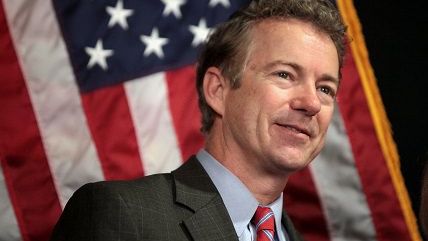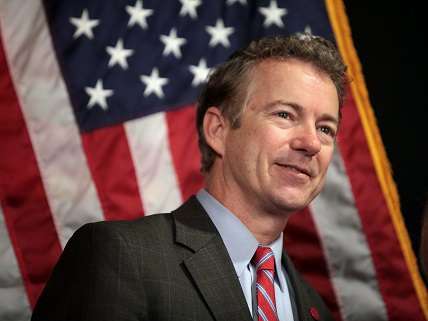Rand Paul Can Run for President and Senate—If He Pays $250,000
Kentucky GOP switches from a primary to a caucus


The Kentucky Republican Party has voted to hold a caucus instead of a primary, which will allow Sen. Rand Paul to get around a state law so that he can run for president and re-election to the Senate at the same time.
Paul announced the GOP's decision on his Facebook page on Saturday:
I applaud the Republican Party of Kentucky on their decision to hold a caucus in the upcoming Republican presidential cycle. The people of Kentucky deserve a voice as the GOP chooses their next nominee, and holding a caucus will ensure that Kentucky is relevant and participates early in the process. I am also grateful for the Republican Party's trust in me, allowing me to run for re-election to the U.S. Senate and seek the nomination for the Presidency of the United States!
There's just one catch: Paul must donate $250,000 to the state GOP to help defray the cost of switching to a caucus. He has until September 18th to make the transfer. Despite early reports to the contrary, Paul hasn't made the payment yet, according to POLITICO.
That aspect of the deal has drawn some criticism. Outside the Beltway's Doug Mataconis accuses Paul of essentially "buying himself a caucus":
It's hard not to walk away from this with anything other than the impression that Paul is buying a method to get himself around a law that would otherwise bar him from running for President while also running for what most every observer believes would be a safe bid for his party's nominate for Senate. Other than the purpose of allowing Paul to get round the law, there doesn't seem to be any other logical reason for the Kentucky Republican Party to agree to a caucus rather than a primary. …
In essence, Rand Paul bought a caucus so that he continue what seems like an increasingly quixotic Presidential bid notwithstanding the fact that caucuses are undemocratic, unfair, and end up being unrepresentative. The Kentucky GOP gets absolutely no benefit out of this other than the fact that it won't have to pay for it. Given the fact that Paul's campaign doesn't seem to be going anywhere, it all seems to be incredibly pointless. Well, perhaps that's unfair. The obvious point of this was to allow Paul to continue running for President, so I guess it succeeded in that respect. Exactly what it does for the voters of Kentucky, though, I have no idea.
I can only surmise that the state party's executive committee believed aiding Paul's presidential run was important enough to override those concerns. The better option, of course, would have been for the state legislature to amend the silly law that prevents Paul from seeking both offices, but the Democrat-controlled state House was never going to let that happen. That Paul is in a bit of an awkward spot because his Senate re-election year happens to fall in 2016 is not his fault, and it has little to do with the state of his campaign.
Paul's actually not even on the 2016 trail at the moment. While many of his rivals are mingling with influential Iowa caucus voters, Paul is spending August in Haiti, saving impoverished people from blindness. Whether that ultimately costs him support in Iowa remains to be seen, although it's hard not to admire Paul for dedicating so much of his time to such a good cause.
For more on the libertarian-leaning senator's quest for the White House, read Brian Doherty's latest report, "Rand Paul Backers Still Believe He Can Stand Out."


Show Comments (159)